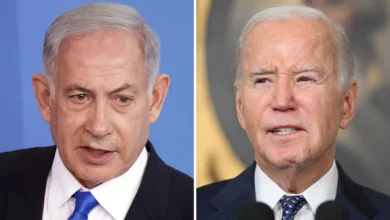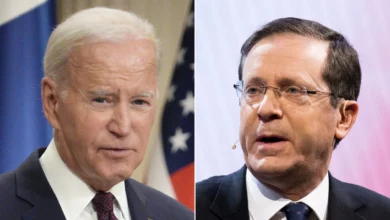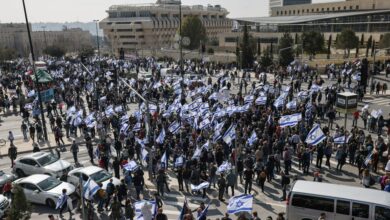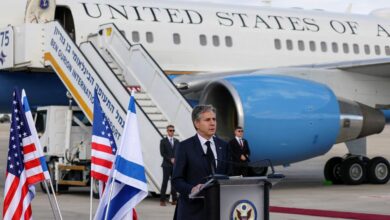
US Secretary of State John Kerry will make a New Year's Day trip to Israel and the Palestinian Territories aiming to push forward peace talks as a nine-month deadline looms.
The announcement of Kerry's 10th visit to the region since March comes as Israel confirmed it would release another 26 Palestinian prisoners as soon as Monday.
“On 1 January, Secretary of State John Kerry will travel to Jerusalem to meet with Prime Minister (Benjamin) Netanyahu, and to Ramallah to meet with president (Mahmud) Abbas,” State Department spokeswoman Jen Psaki said Saturday.
“In these meetings, he will discuss the ongoing final status negotiations between the Israelis and Palestinians, among other issues,” she added in a statement.
After persuading the two sides to resume talks, Kerry has been pushing the Israelis and the Palestinians to reach a peace deal ahead of a deadline set to expire in late April.
Earlier Saturday, a Palestinian official told AFP that Kerry would meet with Abbas on January.
Psaki did not say how long Kerry would stay in Israel, but Palestinian sources said it would be a “number of days”.
As part of the US-brokered deal that led to the relaunch of the peace talks in July, “the release of 26 Palestinian prisoners was authorised this evening", said a statement from Netanyahu's office.
The prisoners were due to be freed "at least 48 hours” after a list of their names was published Saturday night, the statement added.
Israel agreed to free a total of 104 Palestinian prisoners during the peace talks, and has already released 52 in two separate batches. After the third group is released, the remaining inmates are due to walk free in March 2014.
The previous releases in August and October were accompanied by Israeli announcements of fresh construction on land the Palestinians want for a future state, provoking international condemnation and Palestinian officials to say Israeli settlement plans are destroying the peace process.
Netanyahu is expected to announce plans next week for a further 1,400 homes in settlements in the West Bank, including annexed Arab east Jerusalem.
Israeli daily Maariv reported on Thursday that Netanyahu had initially agreed to US and EU appeals to delay an announcement of new construction, but changed his mind under pressure from his coalition partners in order not to project a "signal of weakness”.
Kerry has insisted that concrete progress is being been made in the peace talks but is remaining mum on details.
“I'm personally encouraged that very tough issues are beginning to take shape,” he said in an interview with ABC television on 15 December.
“But we've agreed not to be talking about what we're doing because it just creates great expectations. It creates pressure. It creates opposition, in some cases.
“I think it's much better for us to do exactly what we've been doing, which is negotiate quietly and privately,” he added.
Israeli and Arab media reports say the plan envisaged by Washington would see Israel maintain a military presence on the border for some 10-15 years after a peace agreement with the Palestinians.
An international force would be acceptable to the Palestinians, but Israel opposes such a solution.
During Kerry's last visit to the West Bank on 12 December, Abbas ruled out any formula that would allow an indefinite Israeli troop presence on Palestinian soil.
At an Arab League meeting in Cairo on 21 December, Abbas also rejected any further interim agreements and any prolongation of the talks beyond their agreed end on 29 April.




